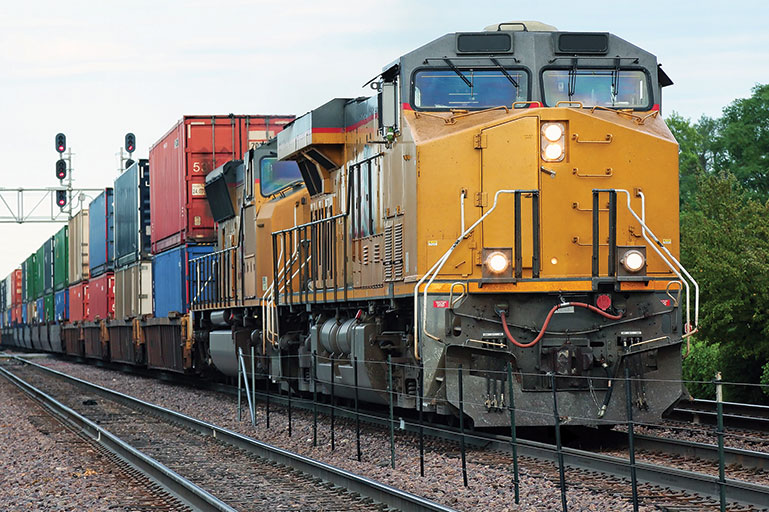AAR and STB offer differing views on two final adopted final rules
The Washington-based Surface Transportation Board (STB), an independent adjudicatory and economic-regulatory agency charged by Congress with resolving railroad rate and service disputes and reviewing proposed railroad mergers, said this week it has adopted two final rules focused on establishing new rate reasonableness procedures, providing what it called two streamlined approaches for shippers and railroads to resolve smaller rate disputes.
STB said that the two final rules are comprised are a voluntary arbitration program, as well as a new procedure for rate challenges, known as a Final Offer Rate Review (FORR). STB initially introduced FORR in September 2019, in a notice of proposed rulemaking (NPRM), saying, at the time, that FORR utilizes procedural limitations to constrain the cost and complexity of a rate case, which would include principle-based, non-prescriptive criteria to allow for innovation with respect to rate review methodologies.
And it explained that both of these rate review mechanisms would be very beneficial for shippers, as it would improve their access to rate reasonableness reviews for smaller rate disputes. But, in order for the voluntary arbitration program to come to fruition, it said that it would require all seven Class I railroads to commit to participating in it for five years and also do so within 50 days of the date of publication of the final rule in the Federal Register. What’s more, STB noted that should all the Class I railroads make this commitment, they would be exempt from FORR procedures.
Following the September 2019 NPRM for the FORR procedure, STB said that five of the Class I railroads came together in filing a joint petition, in which it called on the STB to make them exempt from FORR procedures. In exchange, STB said that the railroads promised to agree to resolve rate cases through binding arbitration, which carriers had not agreed to do over several years. And in November 2021, STB said it advanced FORR and also the establishment of a voluntary arbitration program.
STB said that each of these review mechanisms are limited to rate disputes worth up to $4 million in relief over a two-year period. It also stated that under the arbitration program, Class I rail carriers would commit for a period of five years to arbitrate rate disputes, under a similarly expedited schedule. And it said that the final rule establishing the arbitration program is effective 30 days from the date of publication in the Federal Register, and the final rule establishing the FORR procedure is effective 60 days from the date of publication in the Federal Register.
“The two rules attempt to strike a balance between the competing interests of various stakeholders,” said STB Chairman Martin Oberman in a statement. “While much of the shipper community has expressed a preference for FORR and the railroad community pursued a voluntary arbitration program in lieu of FORR, both rules have much in common—they both offer relief under similar timeframes, allow for flexibility to use different methodologies, and have the same monetary limits. I am confident that either program will provide shippers with access to more meaningful rate relief than was previously available to them. I want to thank all of the Board’s stakeholders for their engagement during these rulemaking processes, and I applaud the Board’s staff for all of their hard work and dedication in bringing these rules to fruition. The Board has long sought a suitable method of making adjudication of smaller rate disputes accessible, reasonable, and less time-consuming for affected parties. Experience has shown that the Board’s prior efforts to provide rate review methods suitable for smaller disputes have been rarely used by shippers.”
The STB’s rules were not warmly received by the Association of American Railroads (AAR), with the AAR calling the FORR “fatally flawed and saying the arbitration rules ignore key principles that could otherwise make STB-sponsored arbitration of small rate disputes a viable option.
“The FORR rule abdicates the agency’s statutory responsibility to determine the maximum reasonable rate,” said AAR President and CEO Ian Jefferies in a statement. “Sound economic principles are abandoned, in favor of an arbitrary procedure that offers no certainty to any stakeholder and instead rewards legal brinksmanship.”
AAR also said that FORR exceeds the agency’s authority, explaining that in a case filed under the new rule, the agency would do no independent analysis or engage in any reasoned decision-making, but instead would simply choose the “final offer” rate proposed either by the shipper or by the railroad.
As for the arbitration rules, it said that the STB’s decision falls short of including substantive provisions that were critical to one or more railroads and also noting that the rule effectively requires all Class I railroads to agree to participate in order for the procedure to be available as an option for any railroad.
“On its face, the ‘all or none’ approach misses the mark and risks undermining the Board’s stated desire for alternative dispute resolution over litigated outcomes,” said Jefferies. “As it stands, even if a vast majority of railroads sign up for ADR, the rule will prevent small rate disputes that could quickly and cost-effectively be arbitrated because anything short of 100 percent industry participation prevents anyone from using it. Unfortunately, today’s decisions could very well result in a missed opportunity to create a workable solution for shippers and railroads alike.”













